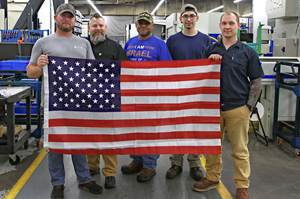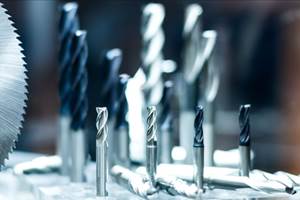Now Is The Time To Train
Improving the proficiency of your personnel will outperform any other single improvement you can make in your CNC environment. Do you want less scrap? Well-trained CNC operators don't make mistakes that scrap parts.
Share




Improving the proficiency of your personnel will outperform any other single improvement you can make in your CNC environment.
Do you want less scrap? Well-trained CNC operators don't make mistakes that scrap parts. Do you want more efficient setups? Well-trained setup people don't waste time trying to figure out how setups are supposed to be made. Do you want your CNC programs to run faster? Well-trained programmers take full advantage of the latest in time-saving technology. And in general, do you want higher profits? Well-trained people will dramatically outperform poorly trained people.
While everyone should readily agree with these statements, it's amazing how many excuses are given for not providing workers with more training. Two common excuses are related to how well the company is doing economically. If times are slow, management says, "We can't afford the cost of the training program." If times are good, management's attitude is, "We are too busy to let anyone take time out for a course."
The reality is that it's always the right time to train. When times are slow, it's the perfect time to train people because there is ample time—and well-trained employees will perform better when times pick up. When times are good, it's also the perfect time to train people because you can easily afford the cost of the training program.
When it comes right down to it, it's simply a matter of choice: Either you choose to help your people improve or you choose not to help them improve. Given the benefits that can be reaped by improving employees' proficiency, this should be an easy choice indeed.
I've heard more than one manager say "If I train my people, they may leave the company for better paying jobs." Well, if you don't train your people, there is still no guarantee that they'll stay with you—and how much can a poorly trained workforce really help your company, anyway? If your company is not competitive with its wages and benefits, you are going to have problems attracting and keeping the best people regardless of how much training you provide.
Your company has committed significant resources to be in business. Just consider the total value of your company. Include land, buildings, machine tools, computers, personnel costs and all other company assets. Now consider the amount you spend per year to ensure that your people—the very people who control your company's destiny—fully understand their responsibilities. And I'm not talking about just making do; I'm talking about having people who are fully versed in the tasks they are assigned to do and can perform them as efficiently as possible. If you expect to stay in business in the long run, you can't afford not to maintain and improve the proficiency of your workers.
There are countless manufacturing-related companies and organizations that can help you in your efforts to provide your employees with training. The Society of Manufacturing Engineers (www.sme.org) and Tooling and Manufacturing Association (www.tmanet.org) both provide seminars related to many facets of manufacturing. You can find numerous links to other training sites at www.cncci.com.
When you consider that the stakes involved are your company's very survival, it is clear that improving the proficiency of your workforce should always be a top priority.
Related Content
Finding Skilled Labor Through Partnerships and Benefits
To combat the skilled labor shortage, this Top Shops honoree turned to partnerships and unique benefits to attract talented workers.
Read MoreAddressing the Manufacturing Labor Shortage Needs to Start Here
Student-run businesses focused on technical training for the trades are taking root across the U.S. Can we — should we — leverage their regional successes into a nationwide platform?
Read MoreThe Power of Practical Demonstrations and Projects
Practical work has served Bridgerland Technical College both in preparing its current students for manufacturing jobs and in appealing to new generations of potential machinists.
Read MoreInside Machineosaurus: Unique Job Shop with Dinosaur-Named CNC Machines, Four-Day Workweek & High-Precision Machining
Take a tour of Machineosaurus, a Massachusetts machine shop where every CNC machine is named after a dinosaur!
Read MoreRead Next
Registration Now Open for the Precision Machining Technology Show (PMTS) 2025
The precision machining industry’s premier event returns to Cleveland, OH, April 1-3.
Read MoreSetting Up the Building Blocks for a Digital Factory
Woodward Inc. spent over a year developing an API to connect machines to its digital factory. Caron Engineering’s MiConnect has cut most of this process while also granting the shop greater access to machine information.
Read MoreBuilding Out a Foundation for Student Machinists
Autodesk and Haas have teamed up to produce an introductory course for students that covers the basics of CAD, CAM and CNC while providing them with a portfolio part.
Read More
.jpg;width=70;height=70;mode=crop)































